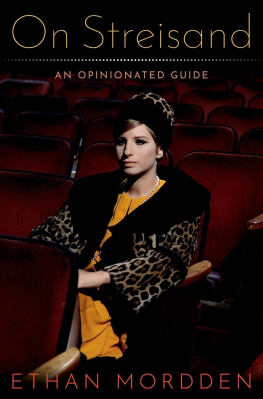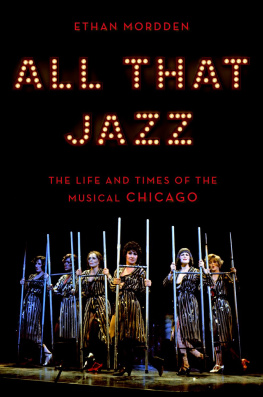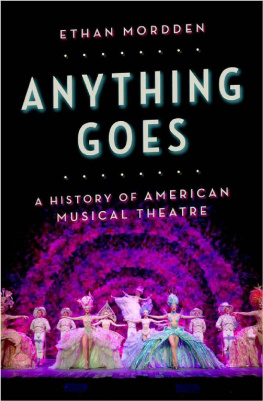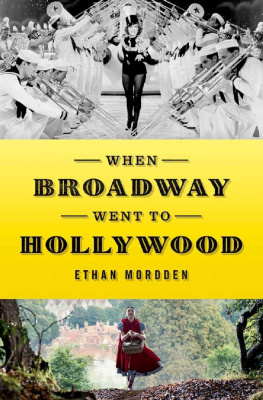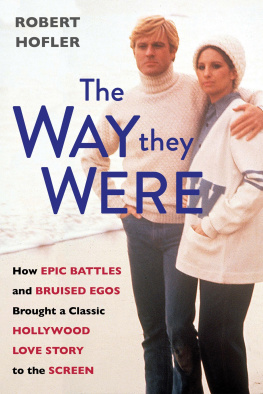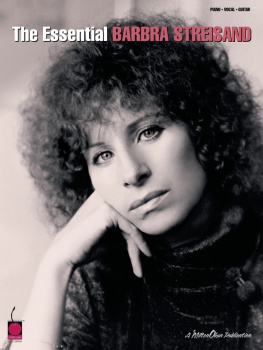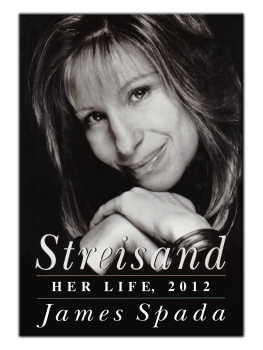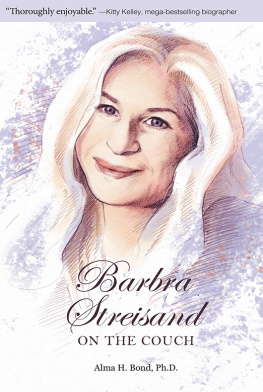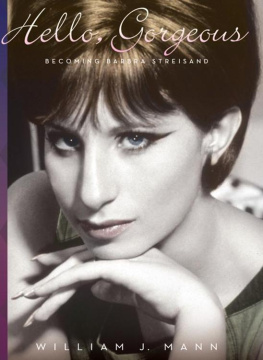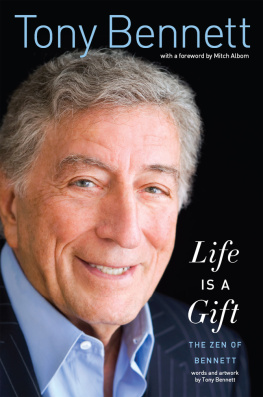To my sublimely tactful agent, Joe Spieler; to helpful friends Matt Callaway, Jon Cronwell, Ken Mandelbaum, and Erick Neher; at Oxford, to the ever-ready Joellyn Ausanka and to Dominic McHugh; and to my splendid editor, Norman Hirschy.
1942 Barbara Joan Streisand born, in Brooklyn, New York, to be educated in public schools through graduation from Erasmus Hall High. Her father dies in her infancy, and her mother, Diana, takes up with Louis Kind, a stepfather out of a crummy fairy tale, verbally abusing BJS when not ignoring her altogether.
1957 and 1960 BJS has a taste of professional acting in upstate New York in summer stock, first interning at the Malden Bridge Playhouse, then turning professional at the Cecilwood Playhouse.
1960 Determined to become an actress, BJS nevertheless takes an informal course in The Great American Songbook, learning repertory from actor Barry Dennen (her first lover) and arranger-accompanist Peter Daniels. Dennen tapes Streisands vocalsfrom Harold Arlen to Walt Disney Silly Symphonyand keeps the tapes when the couple breaks up.
19601961 BJS introduces her song act in increasingly major New York clubsthe grungy Lion, the spiffy Bon Soir, the prestigious Blue Angelmeanwhile emphasizing the unique in respelling her first name. Barbra: the only one.
19611963 BJS enjoys a pride of notable television appearances, from Mike Douglas afternoon talk show to prime-time slots such as The Judy Garland Show, where the two are joined by Broadways belter-in-chief, Ethel Merman, in a now-fabled belt-off. Overall, the TV exposure reveals not only BJSs talent but also her independence.On PM East, empaneled with producer David Susskind, BJS bluntly recalls how, in his agent days, he rudely blew off an appointment with her. In a much-quoted line, virtually a mission statement, she askstellsthe stupefied Susskind, I scare you, dont I? Im so far out, Im in.
1962 BJSs Broadway debut, in I Can Get It For You Wholesale. She becomes personally involved with the leading man, Elliott Gould, though they dont marry till 1963 (and will divorce in 1971).
1962 BJS signs with what is to be her lifelong label, Columbia Records. More independence: the contract gives her complete artistic control.
1963 BJS is Cue Magazines Entertainer of the Year, a mark of absolute national prominence.
1964 More magazine covers: Time and Newsweek run BJS on their covers in recognition of her tour de force in Funny Girl, her second and final Broadway show. The ideal showcase, Funny Girl gives BJS a new-star-in-town triumph almost unprecedented in theatre history, comparable to the excitement created by Jeanne Eagels in the straight play Rain (1922), one of the few performances that can truly be termed legendary.
1966 As BJSs recordings and solo television specials appear, she resists catering to the news media in the traditional show-biz manner, provoking a media fury that haunts her from then on. Rex Reeds hit piece in the New York Times is typical, calling her Barbra the terriblerude, arrogant, anything but a lady.
1966 Jason Emmanuel Gould, BJSs only child, is born.
1967 A Happening in Central Park, a free concert before 135,000 people, expands BJSs popularity on the national scene when most of it is televised a year later. The trash carted away during the four days after the concert takes in a Scrabble game, a Merry Widow corset, a Russian-English dictionary, a sterling-silver ice bucket, and the usual discarded unmentionables without which these events would be incomplete.
19681970 BJSs first three movies are musicals, and Funny Girl wins her the Best Actress Oscar; Streisands first words are Hello, Gorgeous, her opening line from Funny Girl on both stage and screen. Her fourth film is a non-musical, bringing her closer to her determination to act rather than sing. The recordings, however, keep coming.
1969 With Paul Newman and Sidney Poitier (later joined by Steve McQueen and Dustin Hoffman), BJS forms First Artists, to produce movies as she produces her records, with complete artistic control. Again, independence is the key concern. The outfit lasts for some ten years, yielding twenty-three films, three with BJS.
19691970 With new folk- and Beatles-influenced pop writing overwhelming the traditional American Songbook, BJS attempts to adopt current styles, first in the unpersuasive What About Today?, then in the happily conclusive Stoney End. I dont feel it, BJS says at first. It isnt me. Me is Rodgers and Hart, Harold Arlen, andthe caption for this upheaval in pop musicAs Time Goes By. Still, the change in repertory, from What About Today?s sometimes stark or gritty numbers to a more lyrical pop sound on Stoney End, creates a wedding of singer and song. Suddenly, its me.
19711973 Filming The Touch with his usual players and, als Gast, Elliott Gould, Ingmar Bergman meets BJS and is struck by a thought: a movie version of The Merry Widow starring BJS. Bergman has enjoyed a whopping hit staging the operetta in 1954 in Malm, Sweden, and now seeks to preserve his vision of the piece, though how BJS will negotiate a role for a classically trained soprano is anyones guess. Still, here is a rare chance for BJS to appear in a film by a universally acknowledged High Maestro of the art. But she requests script revisions, and Bergman abruptly terminates the project.

